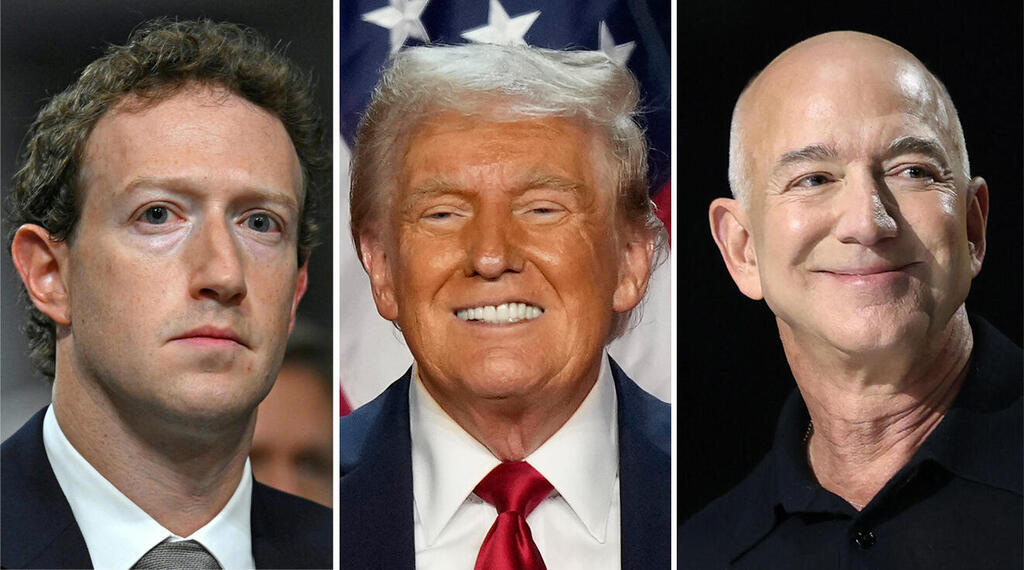
Analysis
Can flattery save Big Tech from Trump’s regulatory hammer?
With antitrust lawsuits looming and tariffs on the horizon, CEOs try to secure exemptions and leniency.
On Friday, two people sat on the luxurious terrace of the Mar-a-Lago estate in Florida for a fine meal. One was the owner of the mansion and the president-elect of the United States, Donald Trump; the other was Tim Cook, the CEO of the technology giant Apple.
Cook had compelling reasons to attend this meeting. Trump has announced that, upon his return to the White House, he intends to impose sweeping tariffs on imports from China—Apple's primary production hub. Such a move could cost the company billions of dollars. According to a report by The New York Times, this meeting was an opportunity for Cook to raise these concerns, along with other pressing issues.
The meeting itself wasn’t unusual. During Trump’s first term, Cook was one of the few tech leaders who managed to maintain a working relationship with the president—at times, even a close and warm one. This rapport allowed Apple to avoid the initial round of tariffs Trump imposed on China. What’s unusual this time, however, is that Cook isn’t alone. The CEOs of other tech giants—many of whom previously clashed with Trump—are now lining up like soldiers to salute the new/old president. They are also speaking to him in the language he understands best: flattery and money. Lots of money.
Trump’s first term was marked by frequent and intense conflicts with the tech sector. Companies criticized his immigration policies and, under pressure from their employees, opposed his travel bans on citizens from Muslim-majority countries. Trump, in turn, accused platforms like Meta (formerly Facebook) and Google of censoring conservative voices, and accused Amazon of exploiting government services and promoting propaganda against him.
The months leading up to the 2024 election didn’t suggest any compromise on Trump’s part. He continued to attack tech companies during the campaign. Since winning the election, he has made a series of appointments signaling a tough stance against the industry. Prominent critics of tech giants, such as Andrew Ferguson at the FTC, Brendan Carr at the FCC, and Gail Slater at the Justice Department’s antitrust division, have been tapped for key regulatory roles. Their appointments made it clear that Trump does not intend to make life easy for Silicon Valley during his second term.
The tech leaders got the message. Since November, they have been signaling their willingness to work with Trump. Silicon Valley’s shift in tone toward Trump began months before the election, particularly after the assassination attempt on him in July. Elon Musk, CEO of Tesla and owner of X (formerly Twitter), had already begun leaning Republican and rallied strongly behind Trump. But the biggest surprise came from Mark Zuckerberg, CEO of Meta, who publicly praised Trump’s response to the assassination attempt, calling his defiant stance with a raised fist “badass.”
After Trump’s election victory, tech CEOs wasted no time congratulating him on social media. Yet his regulatory appointments prompted a pivot to more aggressive tactics than mere online posts.
Zuckerberg has been particularly proactive. According to The Wall Street Journal, Zuckerberg and other Meta executives held meetings in November at Mar-a-Lago with senior officials from Trump’s incoming administration. These culminated in a private dinner between Zuckerberg and Trump, focused on building mutual rapport. Before the dinner, Zuckerberg even gave Trump a private demonstration of Meta’s smart glasses and gifted him a pair. Last week, Zuckerberg went further by donating $1 million to Trump’s inauguration fund—a significant departure from Meta’s previous practice of avoiding direct support for presidential candidates.
Zuckerberg’s actions have set a roadmap for others. Sundar Pichai, CEO of Google, and Jeff Bezos, Amazon’s founder, are expected to meet with Trump later this week. Amazon has also donated $1 million to the inauguration fund. Even Sam Altman, CEO of OpenAI, is reportedly planning a similar contribution, likely influenced by OpenAI’s legal disputes with Elon Musk, who is now one of Trump’s closest allies.
The tech giants have plenty of reasons to seek Trump’s goodwill. Regulatory actions are the most immediate concern. The FTC and Justice Department are pursuing antitrust cases against Google, Meta, Apple, and Amazon. Trump could intensify pressure by launching new investigations or hardening the stance on existing ones—or he could ease the pressure by softening or dismissing these cases. Such actions could have tangible, immediate effects on the companies.
Beyond antitrust, Trump’s proposed tariffs on imports could hit companies like Apple and Amazon directly. Building a rapport with Trump might secure exemptions or delays.
Globally, the companies face increasing regulatory pressures, especially in the European Union, where strict new regulations targeting tech giants have begun forcing them to make significant changes. Apple, for instance, has been compelled to loosen its tightly controlled ecosystem. Additionally, hefty fines—such as the €1.8 billion penalty imposed on Apple in March for anticompetitive practices in the music streaming market—underscore the financial stakes. Trump has already hinted at using U.S. economic power to push back against such measures.
Good relations with Trump could yield other benefits, from regulatory leniency to political influence. But the tech companies face a significant hurdle: Trump’s longstanding animosity toward them. He has not forgotten how platforms like Meta banned him after the Capitol riots on January 6, 2021. The Republican Party, too, has a deep-seated resentment toward these companies.
Yet Trump has shown in the past that he responds well to flattery and financial gestures. The tech giants have deep pockets, and their CEOs—if willing to set aside pride—are finding ways to appeal to his ego. While this strategy doesn’t guarantee success, it stands a good chance of yielding favorable outcomes.















